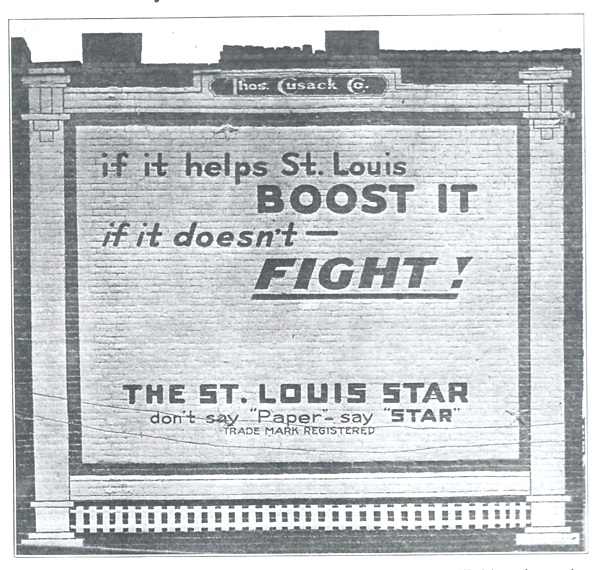A Detailed Look at the Content of an Early St. Louis Newspaper
Here we have a copy of the “Missouri Republican, dated November 7, 1824, published by Edward Charless & Co. at the white house below the Catholic Church.”
On the first page we read various advertisements, “For Sale, 262 acres of first rate farming land lying about 8 miles north of St. Louis. It is mostly prairie with plenty of water and 20 acres in cultivation. Robert Wash.”
John O’Fallon publishes a notice of final settlement of the estates of William Stokes and Jeremiah Connor.
The United States Government inserted the following notice: “Citizens of the United States having claims under the Treaty of Ghent for slaves and other private property taken from them during the late war between the United States and Great Britain are notified to exhibit their claims.”
The St. Louis Agricultural Society sets forth a resolution to offer premiums for the best species of corn, wheat, tobacco and potatoes, and for the greatest number of wolf scalps killed by any one person or family, $20.00 in loan office money. The above premiums will be awarded at the house of Wm. C. Carr on his farm adjoining the City of St. Louis.
Then follows a “Proclamation by the Governor of the State of Missouri” offering a reward for the capture of an escaped convict. “Done at St. Charles the eighteenth day of October, A.D. one thousand eight hundred and twenty four and of the Independence of the United States the forty ninth. A. McNair. By the Governor, Wm. G. Pettus, Secretary of State.”
Another interesting advertisement says, “For Sale at Madame Landreville’s 25 yards of Rag Carpeting, manufactured by the Poor under the superintendence of the Female Charitable Society. It is wide and of good quality. Agnes P. Spaulding, Secretary.”
“Female Academy. Mrs. Mary L. Elliott would respectfully inform the public that the term for which she was engaged as an instructress by the Rev. Mr. Giddings having expired, she intends opening a school in the room under the Baptist Church. Her terms for tuition will be $5.00 per quarter and for the small Misses $3.00.”
Here follows a page of “Late News from Europe” several months old, telling of the successes of Greece in its war with Turkey. Then there is a bit of local news. “Homicide. Mr. William Smith, a native of Germany and a peaceable and good mechanic of this town, being a white smith by trade, was struck with a brickbat on Saturday evening last and died the next day. The person who committed this murderous deed has since absconded.”
That we had, even at that early date, “Letters from the People” is shown by the following, “I would suggest to the General Assembly the propriety of providing by law for the printing of the decisions of the Supreme Court of this State. Even lawyers and judges are unacquainted with them. One of the People.”
Here follows a copy of “An Ordinance to widen Market Street, East of Fourth Street, to fifty English feet in width.”
“Hugh Richards begs to inform the public that he will continue the manufacture of Tobacco, Segars and Snuff at the old stand on Main Street. Wanted two good hands for the making of segars.”
“Strayed or Stolen from Isaac Walker, an Indian of the Delaware tribe, at his encampment west of Chouteau’s Mill Pond, a black mare” etc. describing her.
“Cash will be paid by the subscriber for a negro boy between fourteen and twenty years of age, accustomed to farm work. Charles Chambers, near Florissant.”
“District of Missouri, City of St. Louis, District Court of the United States, September term 1824, ordered that the court will hold a special session on the Fourth Monday in November next under the authority of an Act of Congress entitled, An Act enabling the claimants to lands to institute proceedings to try the validity of their claims.”
Then there is a woodcut of a whiskey still with this announcement “Joseph Liggett has on hand a good assortment of Stills and Stew and Tea Kettles.”
1849 An interesting news item in the Missouri Republican of Jan. 15, 1849 is the following:
“Tea Party – To view the capacious room over the State Tobacco Warehouse, one would suppose it sufficient to accommodate as large a company as would participate in any public festival. Capacious as it is, however, the test made Saturday evening at evening at the German Ladies’ festival, given to raise funds to aid in the struggle for freedom now going on in the Fatherland, proved it insufficient. The room was beautifully decorated with paintings, banners and flags, the music (by the Laclede Band and Polyhymnia Society,) most excellent, the provision ample, and the order and general arrangements complete.”
(From The St. Louis Story by McCune Gill, 1952.)
 The plan which is being executed by the St. Louis Star is intended to create not a passive, but an aggressive spirit of loyalty in St. Louisans. The most potent known power – advertising – is being used on a large scale to bring about the desired results. The slogan that The Star has adopted is “punchy” and brief – “If it helps St. Louis, BOOST it. If it doesn’t – FIGHT.”
The plan which is being executed by the St. Louis Star is intended to create not a passive, but an aggressive spirit of loyalty in St. Louisans. The most potent known power – advertising – is being used on a large scale to bring about the desired results. The slogan that The Star has adopted is “punchy” and brief – “If it helps St. Louis, BOOST it. If it doesn’t – FIGHT.”